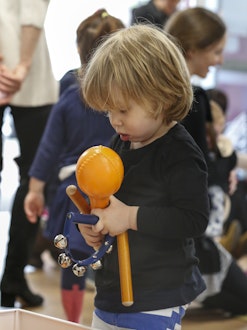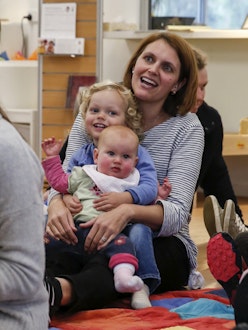Performing Arts
Does music trump reading for childhood development?
There's a fair bit of noise around in early childhood education circles at the moment, lauding the positive effects of music on childhood development.
A recent University of Queensland study investigated the associations between informal home music education for very young children and later cognitive and social-emotional outcomes. The study found that informal music making in the home from the age of two can lead to better numeracy, literacy, social skills, attention and emotion regulation by the age of five.
The study, entitled Being and Becoming Musical: towards a cultural ecological model of early music development aims to provide recommendations for policy and practice in childcare and early learning and development through comprehensive examination of how Australian families use music in their parenting practices. The findings of this study are based not upon formal musical study, or in the context of a formal educational setting, rather, they're based upon informal shared experiences (typically with a parent) and essentially social.
The basis of the findings comes at a time in history when singing in the family home is shown to be at perhaps the lowest level in history, with only one third of parents estimated to be singing [1] to their children below the age of five. And what for the very young children that are in child care , or formal educational contexts such as we have at Scotch with Little Pipers and Three Year old Kindergarten (or 3K as it's affectionately known)?
Simply put, we have a strong desire to strengthen learning through that unique blend of creativity, organised sound and face to face interaction. A recent review of Music at Scotch commissioned by the Headmaster revealed a need for greater focus on developing a love for music in the early years. We want to create a culture where music is intrinsically a part of every young child's daily experience, both at school and in the home. Think along the lines of a Sing-to-Learn style programme every day in the Early Learning Centre; a choir made up of the youngest members of our community and their parents, grandparents, aunts, uncles or caregivers; training and resources to encourage and equip families to return to those informal shared musical experiences in the home at the earliest ages. It's significant and it's incredibly exciting to be initiating.
For more information on our plans for Music in 2020, we invite all families to attend our information evening on Tuesday 26 th November, from 6:30pm in the Memorial Hall.


Staffing update
Mr Niran Dasika, Music Tutor (trumpet), finished his role at Scotch this week in preparation for his relocation to Melbourne. We wish Mr Dasika all the best as he embarks upon the next phase of his music performance and education career. Mr Dasika will be sorely missed by many of the jazz trumpet students at Scotch who had grown to love his lessons and his gentle encouraging nature. Relieving Mr Dasika for the remainder of the year will be the familiar face of Mr Matthew Smith.
Mr Glyn MacDonald, Music Tutor (trombone & jazz piano) and Jazz History Teacher concluded his role at Scotch in week one of this term, in preparation for his relocation to Christchurch, New Zealand. Mr MacDonald has accepted a position with the New Zealand Defence Force Band (Army), where he will employ his high-level skill as a trombonist, pianist and composer/arranger. We wish Mr MacDonald all the best as he prepares to relocate with his family later this year.
Mr Scott Loveday
Head of Performing Arts